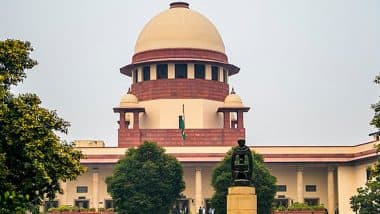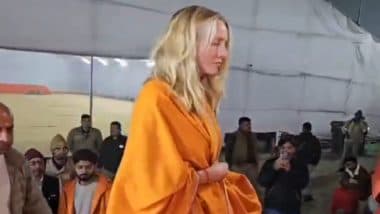New Delhi, October 21: The Supreme Court on Monday stayed the NCPCR recommendations asking states to shift students of unrecognised Madrassas to government schools in view of alleged violation of the Right to Education Act. A bench of Chief Justice of India DY Chandrachud and Justices JB Pardiwala and Manoj Misra in an interim order restrained the Centre and state governments from acting upon the communications of National Commission for Protection of Child Rights (NCPCR).
The order of the top court came on a petition filed by Islamic clerics' body Jamiat Ulema-I-Hind challenging the NCPCR's recommendation. Muslim body's counsel Indira Jaising told the bench that the sweeping nature of the NCPCR's directive lacked legal authority and it would adversely impact the fundamental rights guaranteed under the Constitution. Ullu App: NCPCR Seeks Action From Government Against Streaming Platform for Distributing ‘Obscene and Objectionable’ Material.
The apex child rights body had raised serious concerns about the state of functioning in Madrassas and called for stopping state funding to them unless they comply with the RTE Act, 2009. On June 7, 2024, the NCPCR wrote to the Chief Secretary of the state of Uttar Pradesh directing that that the recognition of Madrassas not complying with the RTE Act be withdrawn. On June 25, the NCPR wrote to the Centre's Ministry of Education to issue directions to all states union territories to conduct inspections of the existing Madrasaas with the UDISE Code.
It recommended that recognition and UDISE Code of Madrassa that do not comply with the norms under the RTE Act to be withdrawn with immediate effect. Following the recommendation, the Uttar Pradesh Chief Secretary wrote to all District Collectors to conduct a detailed investigation of all government-aided/recognised madrassas in state that admit non-Muslim children and for immediate admission of all children enrolled in Madrassas into schools. Nestle Row: NCPCR Asks FSSAI To Review Sugar Content in Company’s Baby Food Products.
Tripura government had also issued similar direction on August 28, 2024. The Union government also wrote to all states and Union Territories to take action as per the NCPCR's instruction. Challenging these recommendations and orders, Jamiat Ulema-I-Hind approached the top court. Another petition is also pending before the apex court which challenging the Allahabad High Court's March 22 decision to strike down the Madrassas Act, 2004.
(This is an unedited and auto-generated story from Syndicated News feed, LatestLY Staff may not have modified or edited the content body)













 Quickly
Quickly






















